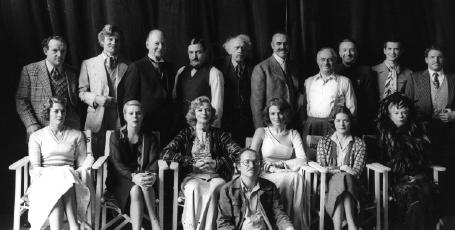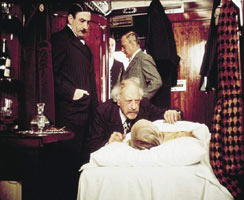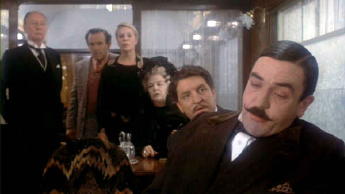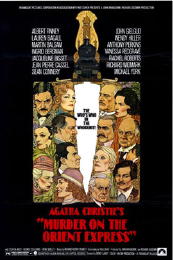Sat 10 Mar 2007
Movie Review: MURDER ON THE ORIENT EXPRESS (1974)
Posted by Steve under Authors , Characters , Mystery movies , Reviews[9] Comments
MURDER ON THE ORIENT EXPRESS. Paramount, 1974. Albert Finney, Lauren Bacall, Martin Balsam, Ingrid Bergman, Jacqueline Bisset, Jean-Pierre Cassel, Sean Connery, John Gielgud, Wendy Hiller, Anthony Perkins, Denis Quilley, Vanessa Redgrave, Rachel Roberts, Richard Widmark, Michael York, George Coulouris. Directed by Sidney Lumet.

They don’t make movies with all-star casts like this anymore, and maybe for a couple of good reasons. First of all, I don’t think you can convince me that in this modern, contemporary era of movie-making there are enough stars with the on-screen magnitude to match the ones you see above to make a film like this today.
And secondly — and here’s a point in favor of the small-scale modern day casting — having too many stars can sometimes detract from the story and divert the audience’s attention away from it.
Your eye sees the star, in other words, and you don’t see the character. The actors play roles rather than disappearing into parts. It probably can’t be helped in extravaganzas like this, but — and this is a rather subtle “but” — in thinking it over afterward, in terms of this grand, elaborate production of one of Agatha Christie’s masterpieces of deductive detective fiction, it may have even helped.

I’m sorry if I’m being cryptic here, but if you’ve seen the movie, it’s possible that you very well know what I mean.
Before going on, and perhaps I shouldn’t admit it, but last night was the first time I’ve seen the film. I don’t know how I missed it when it first came out, or if I did, I’ve forgotten it completely, and I hardly believe I could have done that.
So in what follows, you’re getting my opinion as it’s just been formed, with a “mature” eye, and not by the eye of a 30-something. (Notice that I put “mature” in quotes, keeping in mind that being old enough to collect Social Security does not necessarily imply mature.)
Albert Finney as Poirot. Other than the later BBC productions with David Suchet, and I regret to say that I have seen only one of them, I think too many actors play Poirot as a comic character, what with his large assortment of eccentric mannerisms and sometimes faulty English.
In the opening minutes of Orient Express, I could feel myself cringing at the anticipation of yet another performance played for laughs, but when Poirot gets down the business of solving the murder of a notorious crime figure traveling incognito on the train heading from Istanbul to England, he is exactly that. Down to business.
The final scene, confronting the group of passengers who are the only suspects on the snowbound Express, takes at least 20 minutes of intense revelation, going over the clues and the deductions the Belgian detective made from them.
I should have timed how long the scene actually takes. I know that I’ve read somewhere that filming the scene, in the restricted confines of the dining car, took several days. I can believe it.

Luckily the flashback scenes, with the crime being reconstructed, piece by piece, break up the sequence of talking heads in a rhythm that slowly builds and builds upon itself.
Even so, the lack of action that this approach entails means that there’s hardly action enough to suit modern day audiences, or am I only being cynical again?
Finney is probably the only actor to play a detective concerned with clues and not the third-degree in back rooms to have been nominated for an Oscar, but on second thought, without going to check on it, there’s a finite chance that I’m wrong about that.
But as for his performance, as regarded by others, according to IMDB: “An 84-year-old Agatha Christie attended the movie premiere in November of 1974. It was the only film adaptation in her lifetime that she was completely satisfied with. In particular, she felt that Albert Finney’s performance came closest to her idea of Poirot. She died fourteen months later, on January 12, 1976.”
If she was pleased, then how I dare say anything otherwise? I can’t, and I don’t. As for the rest of the cast, while I enjoyed Lauren Bacall’s role as the the outspoken (and never stopping) American tourist more, it was Ingrid Bergman who actually won an Oscar, for her much briefer part as a semi-demented Swedish missionary lady. A good performance, even a very good one, but I have a feeling it may have been a slow year for the Academy.
Should I say something about the plot, more than I have so far? Perhaps not, but this is a tour de force of some magnitude, based as it was on the kidnapping and murder of the Lindbergh baby. The book was first published in England in 1934, and as Murder in the Calais Coach in the US later the same year.

Before the movie was shown on Turner Classic Movies, which is where I taped it from, the host, Robert Osbourne, pointed out that it took 40 years before the movie could pass the Movie Code. If you know the story, you will know why, and once again, that is all I am able to say about that.
In terms of the detective work — well, let me tell you a story. Back when I was young, and maybe even younger than that, I decided that the next Agatha Christie novel I read, by golly I was going to take detailed notes and actually solve the murder myself. Well I did, and I didn’t.
I was so upset at how the crime was committed and who did it that I literally threw the book across the room. Carefully, of course.
The movie was extremely successful. Albert Finney was asked, but he turned down the opportunity to play Poirot again. Peter Ustinov, chosen in his place, played the part in Death on the Nile (1978), Evil Under the Sun (1982), and Appointment with Death (1988).
He also appeared in three made-for-TV films: Thirteen at Dinner (1985), Dead Man’s Folly (1986), and Murder in Three Acts (1986). From what I remember — I haven’t seen any of these films in a while — I mostly regretted Ustinov in the role. Albert Finney, I think I could have gotten used to, now that I’ve had some time to think it over, and even more so as time goes on.
[UPDATE] 03-11-07. Looking back on my comments above, I regret not saying more about the opening terminal scene with the passengers boarding the train in the Istanbul station. Beautifully photographed, highly choreographed, and true to the period, it is nearly worth the price of admission in itself.
Before I say anything more about it, though, I’m going to have to go back and watch it again. It was far too “visual” the first time, but for me, opening scenes often are. I find myself trying to make sure I’m not missing anything of the story while, at the same time, I’m struggling to take in everything there is to see. Delightful!
[A little bit later.] It was too hard to resist. I’ve just ordered the DVD from Amazon, the version with director Sidney Lumet’s commentary on “The Making of the Movie,” and who should know more how the movie was made than he?
March 14th, 2007 at 1:20 pm
[…] 14 Mar 2007 More on MURDER ON THE ORIENT EXPRESS. Posted by Steve under Mystery movies , Reviews The following conversationbetween Peter Rozovsky and myself previously appeared as a series of comments after my review of the 1974 movie version of Murder on the Orient Express, which you should go back and read, or even re-read, before continuing on with what we had to say. Peter goes first: […]
February 14th, 2009 at 4:31 am
I bow to no one in my admiration for Christie and Murder On the Orient Express is one of my favorites, certainly one of the high points of her career and Poirots, and the movie is something of a tour de force itself (I may be in a minority but I thought the television version with Alfred Molina as Poirot only pointed out how good the movie was in comparison), but I have to agree with Raymond Chandler to the extent that it’s a mystery only a moron or Hercule Poirot could solve. But as an example of murder as a great game it is a masterpiece.
As for beating Christie to the punch there may be one or two minor works where the reader can do that, but when she is at her best, as in Orient Express, your only hope is a good guess and extraordinary luck.
April 3rd, 2009 at 11:56 pm
” I’m sorry if I’m being cryptic here, but if you’ve seen the movie, it’s possible that you very well know what I mean.”
I’ve seen this movie many times over the years. And I don’t know what you mean.
April 4th, 2009 at 12:56 am
Rosie
Here it is, two years after I wrote this review, and I think you’re right. I was too cryptic for my own good.
I don’t know what I meant when I said that either.
I have some guesses, but in instances like this, guesses don’t count.
If or when it comes to me later, I’ll add another comment.
It also occurs to me that it’s time to watch the movie again, which I haven’t, in spite of buying it on DVD.
Best
— Steve
August 20th, 2010 at 12:40 am
It’s now more than a year later, but I never got around to leaving the comment that I promised to leave when I remembered what it was that I’d forgotten.
Which I did, a while later. It didn’t take this long, but — my apologies! — long enough.
Since the explanation may reveal some elements of the ending, all I’ll do now is leave PLOT ALERT Warning, and have you go on to the next comment, should you choose to do so.
August 20th, 2010 at 12:44 am
PLOT ALERT Warning.
The actors are playing roles in the movies, and the roles they are playing are characters who themselves are playing roles.
April 27th, 2011 at 1:45 am
I really cannot imagine anyone thinking that Albert Finney’s performance as Poirot was good. His blustering Englishness and British accent was so strong his performance seemed to me an English caricature of the Belgian detective and was so annoying I almost couldn’t watch the film despite the great performances by the other actors. He just made David Suchet’s performances seem perfect.
December 23rd, 2020 at 1:02 am
I’m just poking around the site this evening and came across this review with huge pleasure.
It’s not a film I have much time to reflect on as an adult; my workaday job is so frenetic I don’t enjoy much woolgathering over pearls like this one.
But this unique production –if any ever did –surely deserves more frequent reflection and savoring, no matter time or tides which have passed since its release date.
It’s utterly phenomenal in so many ways. Look at the production notes on IMDb sometime. Read how Finney managed to shoot this film at the same time he appeared nightly in a West End stage play. Read Jackie Bissett’s comments about Gielgud; basically the driving force of the ensemble.
Too right, all-star casts usually flounder but not this one. I like how every role in the film is given to someone of stature. Jean-Pierre Cassel for example. No, I didn’t know this name at the time I saw the film; I can only appreciate now how marvelous that someone like that and for that matter, someone like Rachel Roberts also comprised this cast. The sheer audacity of it. Every single slot has a formidable name to fill it. Unheard of? I’m not expert enough to say but it sure seems that way to me. Far more common is the international all-star flop, something like “The Poppy is Also a Flower” right?
One forgets how the final sequence was indeed nail-biting in terms of the editing and cutting. I’d seen other mysteries of course before this; many other thrillers; and many other mystery-thrillers but never anything like the final phase of this flick.
The phenomenon of this large ensemble of iconic stars ‘just being stars’ rather than immersing into their roles –yes I agree it is a factor here but I’d aver that for many reasons besides just one reason, that it aids the narrative. If nothing else it does this: you’re able to keep better track of “who is who” when in so many other large-cast movies, characters are lost.
I note with bewilderment –as always –the preference given by some fans for David Suchet over Albert Finney such as the one above (in which someone themselves expresses bewilderment for anyone preferring Albert Finney!); but recognize that this is one of those things which are inexplicable and unresolvable. It can’t be account for and it’s no use to try. I think it must merely suffice to remind ourselves how Finney was propelled to superstardom on the strength of what he accomplished; and how acclaimed this movie was.
In the end, I would go so far as to sound a little mawkish and label this work of the great modern human documents of 20th century. This isn’t fawning–consider the Lindbergh case, this bestselling paperback, and the resultant award-winning movie as a combined product. It spans the century’s culture.
I swear when I clicked on the link to this review and absorbed the b&w group photo I misted up. Wendy Hiller and Anthony Perkins; George Colouris and Lauren Bacall; Michael York and Martin Balsam? Can you stand it? Just look at all those legends in one room together; and bear in mind how many other films they all combined to make great.
December 22nd, 2021 at 1:32 am
Think Entertainment Weekly had an interview with Lumet about making of MOTOE (maybe from DVD you mention), 1st table read the Hollywood movie stars & British theatre legends just stared @ 1 another, starstruck. Lumet had worked with Connery previously, once 007 signed on, the rest followed. This is 1st quality Christie colour feature & only Poirot to be Oscar nominated, Finney set the bar for me with his theatrical performance (appropriate as he was on stage @ night & sleeping on the drive to studio & in hair & make-up). Only time both Bogart’s babies worked together, but they had history: when Bacall was widowed & moved her young family to NYC, she remade herself as a Broadway star (ironic, she’d begun as an usher when young, worked with Kirk Douglas & worshipped Bette Davis), she starred in Cactus Flower & wanted to star in the movie, it went to Ingrid Bergman. Years later, when Bacall was starring in her 1st Tony winner (a musical! in Davis’s role as Margo Channing in All About Eve), Bergman comes backstage to congratulate her, announcing herself as, “The person you hate most in the world!” after taking her Cactus Flower role, it didn’t stop them working together on MOTOE. Lumet wanted Bergman as the princess but she insisted on the smaller role of missionary, Lumet filmed her scene in 1 close-up take, when he said cut Bergman stood up & kissed him, it got her the Oscar. She famously & graciously dedicated her win to another nominee, Valentina Cortese. Lumet began as child actor in Yiddish theatre, went on to direct 12 Angry Men & other NYC classics, so he would seem odd choice for this, but it actually has parallel structure to 12 Angry Men, of course now the jury are also the executioners & MUCH better dressed! Isn’t Martin Balsam in both?